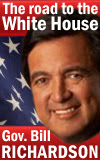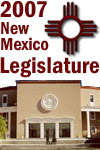 An article in today’s Albuquerque Journal reveals the ethical gray area Gov. Bill Richardson has entered by raising money while the state Legislature is in session.
An article in today’s Albuquerque Journal reveals the ethical gray area Gov. Bill Richardson has entered by raising money while the state Legislature is in session.
On Friday, major Democratic donors Beth and Don Dozoretz hosted a campaign event for
Thus began an argument about whether the couple has opted to support
Though the Dozoretz event was billed as “an opportunity for individuals to meet Governor Bill Richardson” in the invitation, which noted that “a contribution is not required to attend,” it also gave instructions for donating.
Those are the stakes: The Dozoretzes, rich and influential Democrats, are critical to
The Journal pointed out today that Ron Dozoretz has major business interests in
At the same time, the Journal reported, FHC Health System, ValueOptions’ parent company, gave $50,000 to
Something in return?
The company is asking state legislators and the governor this year for an increase in the amount of money the state pays to service providers, and is also considering controversial changes in its services, the Journal reported, including cutting some services and replacing them with cheaper options.
State Sen. Leonard Lee Rawson, R-Las Cruces, told the Journal the situation “looks bad, smells bad.”
Here’s why: Rawson recently asked Attorney General Gary King for an opinion on whether
You can read Rawson’s letter to King by clicking here. An opinion by King’s office is expected within days, the Journal reported.
A
Regardless,
In an interview with me last week, Rawson asked a more important question: Even if it’s legal for
“Legal or illegal, is it ethical?” Rawson asked. “When you have legislation dealing with industry coming up, I really wonder. … You know it has an effect.”
Situation illustrates need for reform
This situation is a perfect illustrator of the need for campaign finance reform. It’s valid to worry that Richardson’s decisions during the session could be influenced by help he receives for his White House bid, no matter what the governor says. At the same time, if he doesn’t start raising money now,
That’s clue No. 1 that there is too much money in politics:
Until we reform the system, we get mostly candidates who are willing to wade into such ethical quandaries, because those who aren’t willing to go there generally can’t raise the money to become serious candidates.
To compete,
In a recent interview with the Albuquerque Tribune,
It’s notable that Richardson is pushing for ethics reforms in New Mexico this year that include campaign finance reform, but it’s also notable that he waited until his last election in New Mexico was over before he got serious about it.
The second part of that statement notwithstanding,
Many legislators are lukewarm on ethics reform
 That’s also a valid point. We have a group of Democratic lawmakers who have watered down some of the proposals of the governor’s ethics reform task force before introducing them as bills, and we have a number of Republican lawmakers who oppose the reforms altogether.
That’s also a valid point. We have a group of Democratic lawmakers who have watered down some of the proposals of the governor’s ethics reform task force before introducing them as bills, and we have a number of Republican lawmakers who oppose the reforms altogether.
As reported in a separate article in the Journal, the House Voters and Elections Committee on Tuesday voted 7-5, along party lines, to endorse publicly financed elections for statewide and judicial candidates, a bill sponsored by Speaker of the House Ben Lujan.
The issue was so hotly debated and consumed so much time that the panel had to delay votes on two other campaign finance reform proposals, the Journal reported. Many believe some lawmakers are trying to slow the bills down so they have less chance of being approved.
Minority Whip Dan Foley, R-Roswell, who voted against public financing on Tuesday, told the Journal that the Democrats’ ethics reform proposals are “another example of smoke and mirrors by the majority party.”
I should point out that, though many Republicans oppose the bills, a few have co-sponsored them. There are even a couple of Republicans who have sponsored their own ethics reform bills, only to have them shot down in committees by Democrats.
I should also point out that many Democrats have pushed for the tougher reforms recommended by the task force, but agreed to weaken them in compromises with Democratic colleagues who don’t want serious reform.
For example, the proposed state ethics commission won’t have the power to discipline those it finds in violation of state law, though the task force recommended that. The argument among some Democratic lawmakers is that legislators have committees to police their own activity.
But House Democrats haven’t done a thing to investigate a situation involving capital outlay money that was misspent last year by the wife of a state House member from
House Democrats have also introduced a bill capping at $250 the value of gifts public officials can accept during the session, though the task force wanted a cap of $100.
Citizens must demand change
Still, the Republicans are wrong to say the measures would only add more regulations that can be circumvented. Many conservatives say regulations on campaign finance will create a system in which only the rich can afford to run for office.
But the way things stand now, the rich have too much control of those who run for office, and citizens, with few exceptions, get to choose only from among candidates who are willing to submit to such influence.
The state reforms need to be approved, and proponents of change need to continue pushing even after that. The federal system needs reformed, too, as the situation with
It’s only going to happen if citizens demand it.